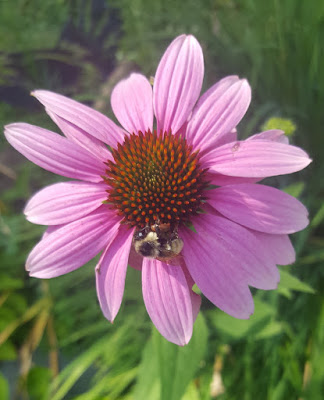 |
| Bee balm hinting at future redness in the tomatoes. |
In committing this summer to creating balance in my life between inside and outside, brain labour and body labour, sitting down and moving around, books and dirt, I have felt so much better. I look forward to and enjoy my work around the yard in the evenings, even with the deer flies buzzing and biting, even with feeling like most of my work is pulling weeds!
There is balance even in the weeds. Although currently the balance of weeds on my property has the weeds winning!
Nevertheless, spending more time outside in my gardens, watching my kale regrow after being eaten by, mostly likely, the groundhog, seeing the bright red bee balm flourish everywhere (!), and being in the "new and improved" greenhouse at least twice day now, I can say I feel the difference. I feel a balance restored to me that a mere hour-long walk every morning couldn't do. There is something about gardening -- tending to the soil, the seeds, the plants, the fruits and the flowers -- that truly taps into something essential.
This is from the opening of an article in the July/August issue of Spirituality & Health magazine. The article is actually an excerpt from Sue Stuart-Smith's book, "The Well-Gardened Mind" (Scribner, 2020).
~ We are a grassland species that emerged in the savannah landscapes of Africa.
Over the course of evolution, our nervous and immune systems have been primed to function best in response to various aspects of the natural world. This includes how much sunlight we get, the kind of microbes we are exposed to, the amount of green vegetation around us, and the type of exercise we take.
When we work with nature outside us, we work with nature inside us. It is why people feel more fully alive and energized in the natural world, why gardeners report feeling calmer and more vigorous, and why spending time in nature awakens the connection-seeking aspect of our human nature. ~
Later, Stuart-Smith wrote,
~ The contemporary emphasis on self-improvement and self-investment can make caring for something other than ourselves seem like a depleting activity, but the neuro-chemistry of care is not like that. Care has inbuilt neuro-chemical rewards. The feelings of calm and contentment that accompany nurture have benefits for giver and receiver alike, and there are obvious evolutionary reasons why this should be so. The anti-stress and antidepressant effect of these pleasurable feelings arises through the action of the bonding hormone oxytocin and release of beta-endorphins, the brain's natural opioids. ~
What a beautifully written argument for more nature, more gardening, more outside. Everyone needs to spend time taking care of plants, putting their hands in dirt, hearing water pour over plants. It's healing, it's uplifting, it's essential.

No comments:
Post a Comment